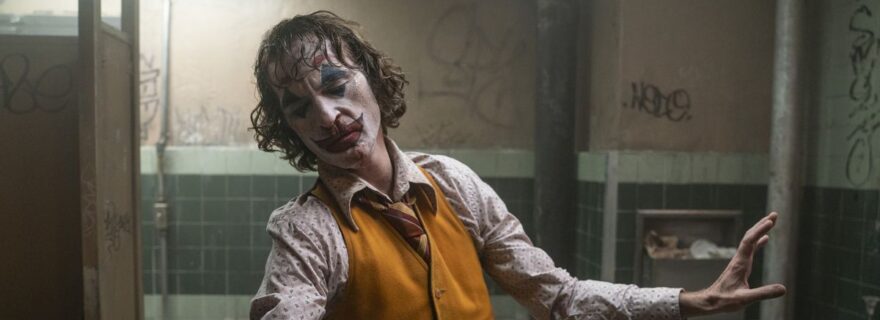Joker
Movie Rating:
3
Few films this year have gotten as much pre-release buzz as Joker. After all that speculation, we can finally see the already-laureled movie and it’s mostly fine.
The DC Comics villain’s latest iteration comes to screen from the director who also brought us Old School, Road Trip, and all three parts of The Hangover saga. While this is not Todd Phillip’s first foray into the darker side of cinema, this time he teamed up with Joaquin Phoenix to bring the infamous clown to life.
While Phoenix’s performance veers into cartoonish and unbelievable at times, it’s spot-on for a comic book adaptation which occasionally bares its roots. He laughs maniacally. He imagines himself suave. He walks with all the grace of an ogre. The physicality and emotional rigor of the part of this evil man are easily met by a seasoned professional such as Phoenix.
The plot of Joker offers nothing new, by design. It’s the straightforward origin tale of one of the better known bad guys. Arthur Fleck is a mentally unstable man who has been failed on many fronts. The government fails him by cutting off his medication and only offering him an unfeeling clinical counselor. His mother (Frances Conroy) fails him by being unable to provide a happy childhood and stable home. His job fails him by letting him go. All of these failures lead to Arthur feeling like a victim of the system. When push finally comes to shove, he snaps and takes his angry vengeance out on what he sees as the biggest symbol of his failure as a man and the father he never had. Or, at least that’s one interpretation of Joker.
Another way to see all this is as the actions of a mentally unstable man who’s being held accountable for his actions. He was rightly fired for being dangerous around children. He refuses to comply with his therapist’s simple requests. He could have been the one to create a home for his infirmed mother. He has no stand on politics or the state of Gotham (which is doing a flawless 1970s New York City impression). He’s just another crazy person lashing out at the easiest target in his scope.
If you can believe it, Joker leans into both possible interpretations in different ways. All of the text within the script points toward Arthur being an apolitical madman who just wants to watch the world burn. He seemingly has no aspirations of grandeur or even retribution. But the visual language of the film tells an entirely different tale. Arthur is framed as godlike by an admiring camera. We nearly always see him from a low angle, as if the audience was on its knees at Arthur’s feet whenever he deigns to grace the screen with his majesty. And there’s the massive matter of the dancing.
In what feels like hours of the film’s running time, we see Arthur dancing. Sometimes it’s lovingly with his mother, sometimes it’s a horrific contortion as he finds his greater sense of antisocial self, but in any case this guy is always moving and shaking. The movements are reflective of his growing confidence and correspondingly growing interest in mayhem, and they are omnipresent. The celebratory dance when he finally dyes his hair green is one of the more beautifully filmed scenes in the entire film, as well as one of the most indulgent visually. Joker has come to life.
This middling messaging gives the film an overall underwhelming effect. It’s difficult to root for a guy who makes so many bad choices, even as a burgeoning antihero. And it’s difficult to root against society as a construct when we see no real evidence that there’s anything within that world worth saving. Then again, nothing in that world is presented as especially offensive either. It’s all just kind of fine.
I’m quite happy to report that Joker stops short of being the incel call to arms that it could have potentially become. The film’s treatment of women isn’t great, but that’s all shown as being a negative aspect of Arthur’s behavior, not a reason to celebrate him. Additionally, the movie makes a point to call out the hazards of worshipping false idols, and in turn criticizes fan culture, but that more hidden message might get lost on the people who don’t wish to see it.
Often beautiful, often dancing, and rarely opinionated, Joker‘s bark is far worse than its bite.




Shannon Nutt
We saw much different films.
A+ from me; I thought it was fantastic.
Deaditelord
I’ll side with Dierdre here. Good movie, but massively overrated.
Dave
A+ as well and one of the best films of this year!
Dave
I cant take a “critic” seriously who gave the the first purge a higher score….
Josh Zyber
The movie’s barely at 70% on Rotten Tomatoes right now, and Deirdre is in a lot of good company in not overly caring for it. If you don’t want to take her seriously, take your pick of some other critics who felt the same:
New York Times:
https://www.nytimes.com/2019/10/03/movies/joker-review.html
Slate:
https://slate.com/culture/2019/10/joker-movie-review-joaquin-phoenix-violence.html
Wall Street Journal:
https://www.wsj.com/articles/joker-review-the-laughs-on-us-11570131914
NPR:
https://www.npr.org/2019/10/03/765082771/joker-is-wild-ly-dull?utm_medium=RSS&utm_campaign=movies
New Yorker:
https://www.newyorker.com/culture/the-front-row/joker-is-a-viewing-experience-of-rare-numbing-emptiness
The Guardian:
https://www.theguardian.com/film/2019/oct/03/joker-review-joaquin-phoenix-todd-phillips
Josh Zyber
I’m not saying you’re wrong for liking the movie. However, Deirdre is not some lone voice being a contrarian about a movie that’s otherwise universally beloved.
Joker is an intentionally provocative movie, and some people will respond differently to it than others, which is why we ran two reviews. As you may recall, Jason was a huge fan of it:
https://www.highdefdigest.com/blog/tiff-2019-joker-movie-review/
Shannon Nutt
70 percent with critics…and 90 percent with audiences. 🙂
That said, I don’t think Dierdre’s review is a pan. She says “it’s fine” and I respect that – but I think the movie would have paid a disservice to its source had it made EITHER Joker or Gotham city itself sympathetic. I mean, isn’t that the whole reason Batman is needed in the first place?
Dave
I just think films like Joker, haunt, It 2, Good boys, Stubber, Ana, Brightburn and Angel has fallen, Hellboy and Glass all deserved to be rated higher, so in the future I will look to other reviewers for movie watching advice. Not intending for this comment to come off as rude and hope my previous one did not either.
Josh Zyber
Fair enough, but I think you’re going to have a really hard time finding many other reviewers who would go to bat for some of those movies, like Stuber or the Hellboy reboot. Again, I’m not saying that you’re wrong for liking those movies, just that Deirdre’s ratings for them seem to be pretty much in line with the general critical consensus.
I didn’t hire some Armond White here who would praise terrible movies and pan great ones just to be a click-bait contrarian. I don’t expect every reader to agree with all of Deirdre’s opinions (or any of our writers’, including my own), but I think she has done a good job of explaining why she gives the ratings she does.
Dave
I agree with you 100 percent; I think my taste are more Joe Bob Brigs than Roger Ebert since I just watched Doom Annihilation and of course its bad, but in an endearing way, like Knott’s scary farm compared to Universal Halloween Horror Nights. She is a great reviewer and an asset to the site for sure and she always articulates her scores very well, so I apologize if It sounded like I came after her. I am now going to look up who Arman White is and see if he liked Rambo Last Blood, jk, thanks for the response as always Josh.